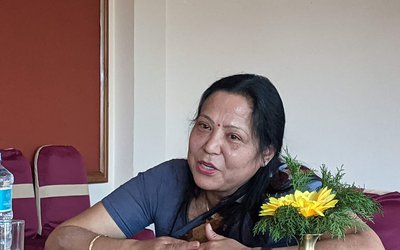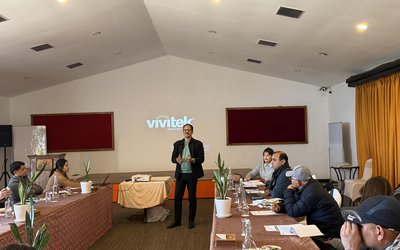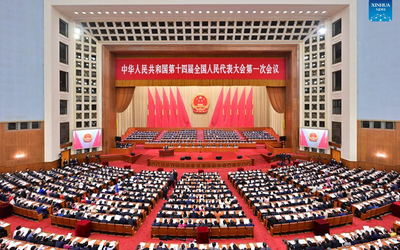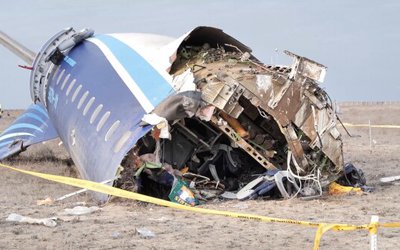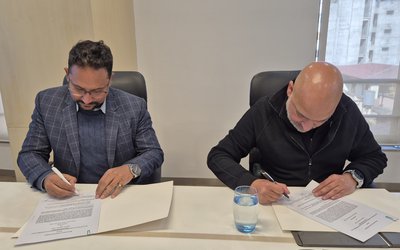Member of National Human Rights Commission GAURI PRADHAN has been in the human rights movement for more than two and a half decade. Founding president of CWIN, a child rights non-governmental organization, Pradhan, a soft spoken person, spoke to NEW SPOTLIGHT on various issues. Excerpts:
What is the state of human rights in Nepal?
I have to admit that the situation of human rights has not improved as we expected after the signing of the Comprehensive Peace Agreement. It is in the process of improvement. Law and order situation has improved and rights violation from security forces, extra judicial killings, and torture have reduced. This is a positive sign. Meantime, we have seen very worse incidents of rights violation. There are heinous crimes happening like kidnapping children and killing them. Even there are sporadic incidents of violation of human rights by security forces. Similarly, the bandhs are yet to come down.
It is unfortunate that the victims of ten years old conflict are yet to get justice and relief from the government.
How do you look at the commitment of political parties?
From CPA to present seven point agreement, political parties have been expressing their commitment to set up the Truth and Reconciliation Commission and Disappearance Commission but they are yet to translate their commitments into practice. The TRC and Disappearance bills are still pending in the Legislature Parliament. National Human Rights Commission has also been raising the issue from time to time. There is no progress at all in the process of prosecution against the rights violators. Positive sign is that the government is accepting suggestions of National Human Rights Commission and providing certain relief packages to the victims of conflict. This is a good progress. However, it is yet to take any actions against those involved in heinous violation of human rights like persons involved in killing and disappearance. There is little progress in the areas of returning the confiscated property and rehabilitation of the rightful owners.
How has the National Human Rights Commission been working?
National Human Rights Commission apprises the government and political parties from time to time on this issue. We have already complained on withdrawal of cases against the people as well as giving amnesty to certain individual. Of course, the state has authority to withdraw the cases from the court showing convincing justifications. The government must follow the criteria before recommending withdrawal of cases and amnesty. The government should not go on individual cases. In cases where Supreme Court has already issued the order, the government needs to respect it.
Five years have already passed since the signing of the Comprehensive Peace Agreement, but the process of reconciliation is yet to start. Don’t you think this will erode the situation?
Different governments have been making various efforts to start the process of reconciliation but they are yet to give it a shape. It is unfortunate that we had five prime ministers in five years. All the five prime ministers stressed the need to introduce the Truth and Reconciliation Commission but none of them set it up. On the issue of bringing TRC and Disappearance bills, along with the government, the Constituent Assembly also needs to take the step. The government has been saying that it has already tabled the bill in the Legislature Parliament and the ball is now in the Parliament’s court. We have apprised the president of various political parties and government. I think the government is showing reluctance to pass the bill assuming the possible consequences. The process of delaying the bill will erode the credibility of political leadership.
Prime minister Dr. Baburam Bhattarai recently said that human rights activists are farming dollars. What do you say about this statement?
The person with such a high stature leading the government should not make such cheap comments. This does not suit such a leader who led the rebellion and who sought the support of human rights activists. We faced similar charges from the government when we were defending the rights of Baburamji. This seems to be the government language. This is very unfortunate. Human rights activists have no intention to create anarchy and spoil the peace process by raising the rights issue. What we want is everything should be done through the due process of law. That’s all.
As Nepal is celebrating the World Human Rights Day, what should be Nepal’s priority regarding human rights or human wrongs?
Along with human rights, we need to raise the issue of human wrongs also. This is a very important issue. Within the human rights, there are also human duties. There are many clauses in universal declaration of human rights which stress on the duties and responsibilities of the human beings. Every citizen can exercise his rights without violating others’. In our society, we just talk about our rights but never talk about other’s rights. Some political parties, communities have been disturbing the life of common people. For instance, the closure of schools, highways and hospitals for indefinite period harms the rights of others. Violation of others’ rights is also violation of human rights. National Human Rights Commission is also raising the question of responsibility. We are also opposing the move to establish parallel police organizations and administrative units. These kinds of act are also violation of human rights. National Human Rights Commission is taking up these issues.
You have been involved in the child rights issue for a long time. How do you see the state of child rights after the conflicts?
Nepal government has recently prepared the mid-term report on the state of child rights in Nepal. The government now wants our views. In the last few years, we have made a good progress in child health and child education issue. It is unfortunate that we have yet to make progress in nutrition. In the present context of growing insecure situation, overwhelming crime is directed against women and children. Women trafficking, violence against women and kidnapping of children and killing continue to rise. Although the number is few, they are more heinous crimes.
- SWISS SUPPORT: Construction Of A Trekking Trail In Koshi
- Dec 19, 2024
- PM OLI'S VISIT TO CHINA: BRI Agreement
- Dec 16, 2024
- RASUWAGADHI AND SANJEN: Begin Generation
- Dec 03, 2024
- NEPAL, INDIA ELECTRICITY TRADE Nepal's Advantage
- Dec 02, 2024
- PM Oli'S VISIT TO CHINA: Nepal's Dilemma
- Dec 01, 2024






